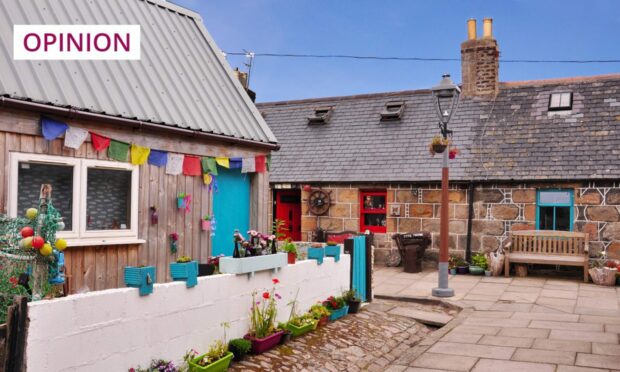Being part of the wider story of our home helps build community and a sense of collective identity – both of which are essential, writes Lesley Anne Rose, co-founder of Aberdeen-based cultural organisation, Open Road.
According to Article 27 of the Universal Declaration of Human Rights, “everyone has the right freely to participate in the cultural life of the community”. But what do we mean by cultural life, and how can we participate in it at a community level?
At Open Road, we’ve been privileged to put this human right to the test by working with the harbourside community of Fittie in Aberdeen for the past 18 months, with a project called Safe Harbour: Open Sea.
Funding to undertake this work came through from the Scottish Government at the end of 2020, via Creative Scotland. The aim of the fund was to use arts and culture to help communities re-build post-Covid.

Our aim was to use culture in all its forms to bring people together, and breathe life back into the local community hall, which had to close during lockdown.
Over the lifetime of Safe Harbour: Open Sea, we’ve established a community choir, run film nights and music events, organised creative workshops, and hosted exhibitions. All of this has enabled residents to have access to and participate in arts and culture at the heart of their community. But why should this be a human right?
Culture stops isolation and improves wellbeing
We can already see the health and wellbeing benefits. Bupa and the British Lung Foundation encourage singing in groups as a way to reduce stress and improve mental and physical health. Our choir members regularly say how much better they feel at the end of sessions.
Cultural events in communities bring neighbours together for a shared “good night out” on their own doorsteps. This becomes all the more important as the cost-of-living crisis deepens, and old and young people alike suffer from social isolation.
But don’t just take my word for it. Following a community survey in Fittie, culture came out top of what residents wanted from their community hall.
We had a great afternoon catching up with Kathryn Welch from @CultureColSco about our Safe Harbour: Open Sea project and meeting local @KevinStewartMSP thank you for coming to Fittie and chatting with us Kevin Stewart SNP and Kathryn, it's been wonderful! @CreativeScots pic.twitter.com/hZb4yWos5d
— Open Road (@openroadltd) January 27, 2023
Being part of the wider story of the place we call home helps build community cohesion and a sense of collective identity – both of which are essential in times of crisis and change.
As Fittie changed and older residents passed away, it became important to capture and preserve memories of the past, alongside the stories of the present. From these stories, the artists we worked with created a visitor trail and book, and crafted an exhibition.
We are now looking forwards and writing a story for the future of Fittie, to support local community action on climate change. It’s everyone’s human right to have a voice in that future, as well opportunities to come together, sing and share stories. Culture, and funding for culture, at the heart of communities does just that.
Lesley Anne Rose is a writer, creative producer and co-founder of Open Road, an Aberdeen-based cultural organisation

Conversation